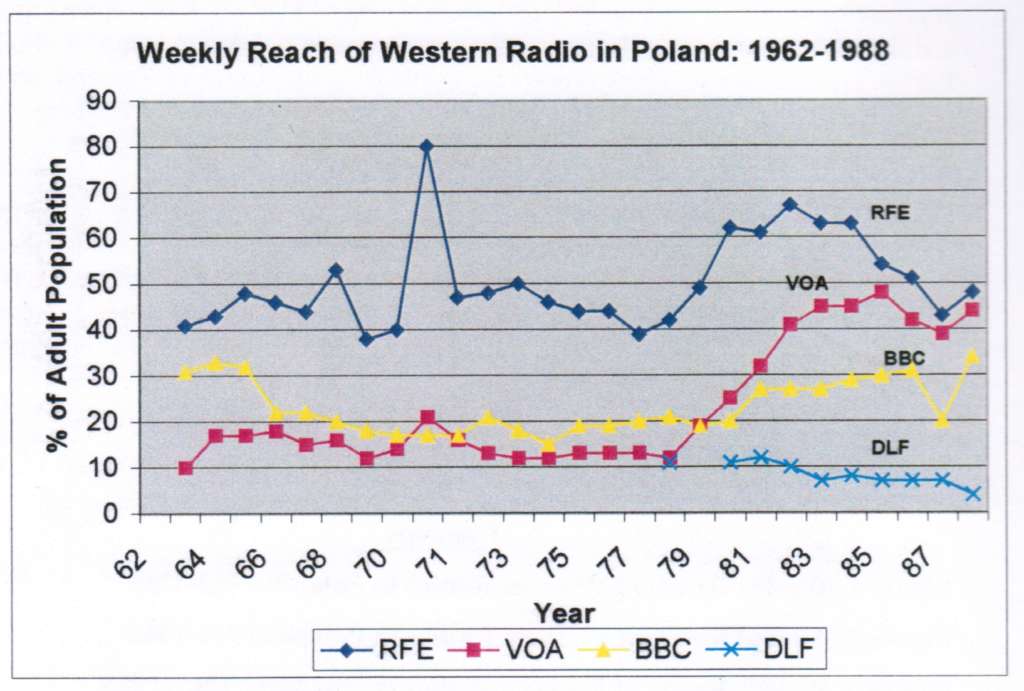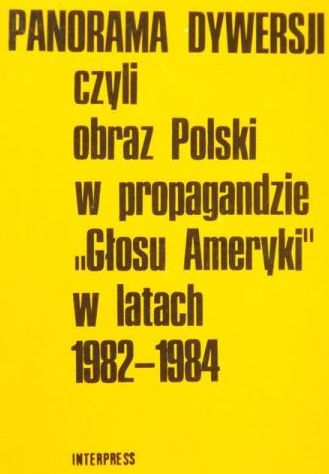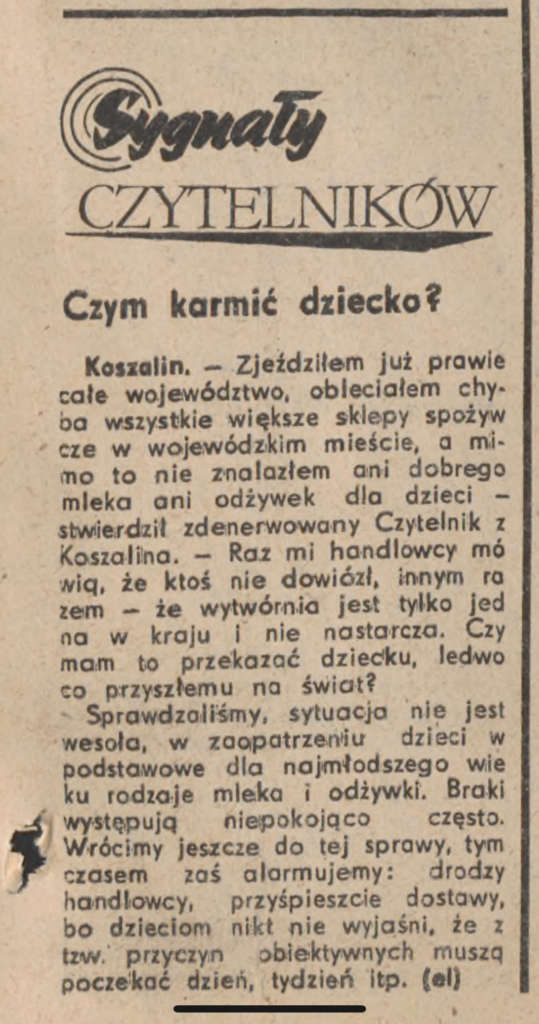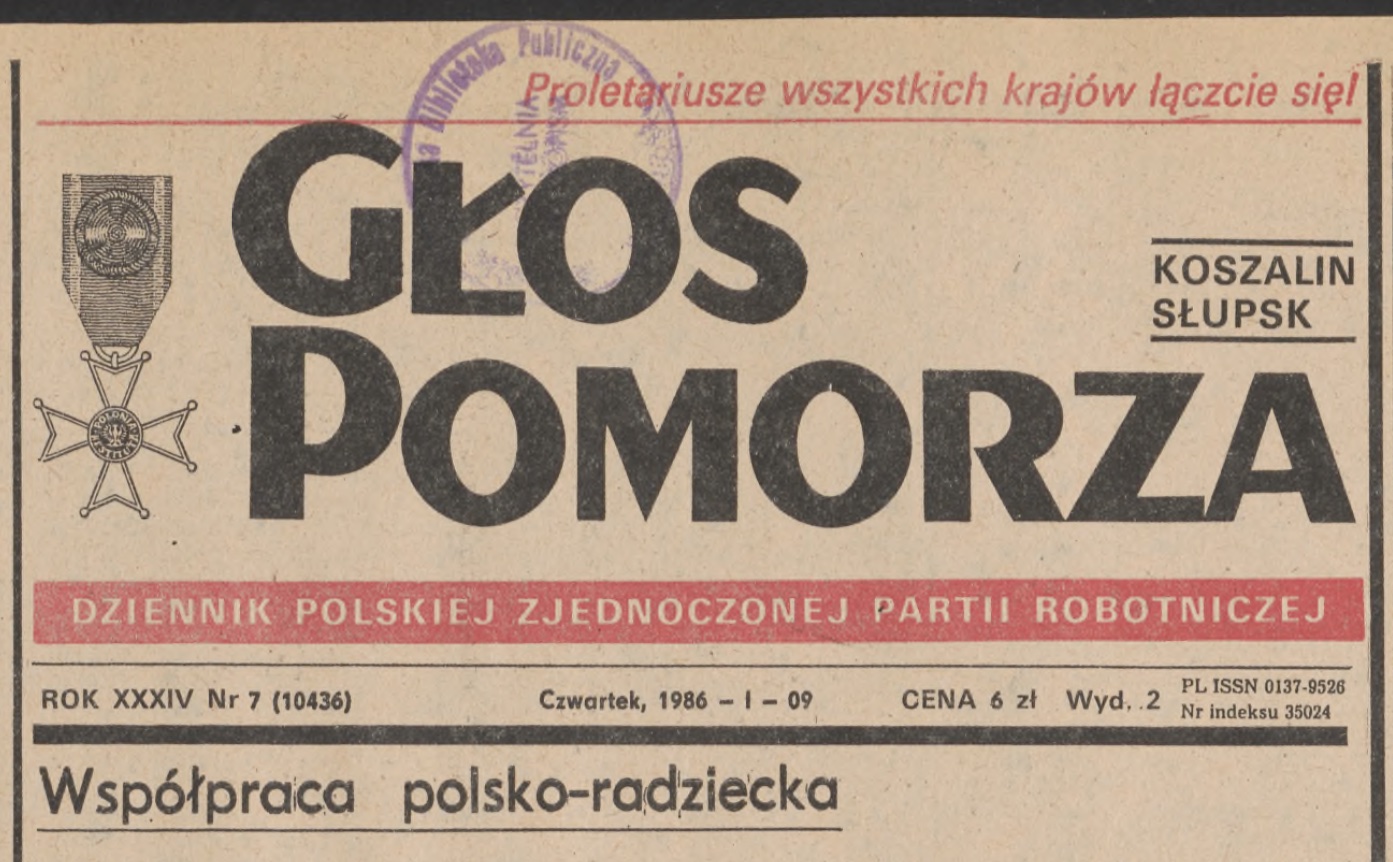by Ted Lipien

Kazimierz Adamski, “Dywersja Głosu Ameryki: Polska na specjalny obstalunek,” Głos Pomorza, January 9, 1986.
An article titled, “DYWERSJA ‘GŁOSU AMERYKI’ Polska na specjalny obstalunek” (“‘Voice of America’ Sabotage: Poland by Special Order“), appeared in the regional Polish Communist Party newspaper Głos Pomorza on Poland’s Baltic coast on January 9, 1986. 1 It was a review of a book published by the Warsaw regime’s media agency “Interpress” under the title “Panorama of Sabotage – Image of Poland in Voice of America Propaganda 1982-1984.” Someone writing for the Communist Party newspaper under the name Kazimierz Adamski accused VOA Polish Service journalists of being saboteurs sponsored by Ronald Reagan and employed by the United States government. The communist commentator blamed us for trying to nullify the results of the 1944 Yalta Agreement, tearing out Poland from the alliance of socialist states and attempting to bring back capitalism. We were also accused by the author of the article and the authors of the book he reviewed of lying about dire political conditions in the country and about the crisis of Poland’s state-controlled socialist economy.
As all Polish Communist Party newspapers, Głos Pomorza displayed in red letters the slogan:
“Proletariusze wszystkich krajów łączcie się” (“Workers of All Countries, Unite!”).
The lead article on page one was titled:
“Współpraca polsko-radziecka” (“Polish-Soviet Cooperation.”)
The “‘Voice of America’ Sabotage: Poland by Special Order” article was on page four.
GŁOS POMORZA – Daily Newspaper of the Polish United Workers Party [Communist] in Koszalin and Słupsk, Thursday, January 09, 1986
Kazimierz Adamski, “Dywersja Głosu Ameryki: Polska na specjalny obstalunek,” Głos Pomorza, January 9, 1986, page 4, https://bibliotekacyfrowa.eu/Content/3527/Image001.pdf.
“Voice of America” Sabotage
Poland by Special Order
What kind of a country is it whose best sons are denied freedom, repressed and destroyed with premeditation? A country in which the regime systematically mistreats children, women and the elderly? A country which undergoes the process of the biological destruction of society, where action is taken to destroy culture, the press and educational institutions, where intellectuals are harassed , and where under any pretext citizens are thrown in prisons and threatened with being sent to Siberia. A country in a total political and economic impasse, a country of terrible living conditions, a country without any chances and perspectives? What is this country, in which the authorities removed from their own nation force prisoners to work in labor camps – because no one wants to work for the bad regime and the system.
Such a country supposedly exists. All one has to do is to turn on a radio receiver at anytime and tune in to the government broadcaster of the United States of America to become convinced that this country exists and that it called Poland by this broadcaster. People speaking to us from radio receivers are trying to tell us that this Poland created by them is the only one and the only true Poland. Poland “made in America” by a special order of the United States government and under the personal patronage of President Reagan is a country clearly doomed to be lost, hopeless and gloomy. And there is only one chance for this fictitious country: the revision of Yalta, tearing out Poland from the alliance of socialist states, and the return to the capitalist system – not to mention placing it under the care of the transoceanic superpower.
An interesting book has just been published by “Interpress” under the title “Panorama of Sabotage – Image of Poland in Voice of America Propaganda 1982-1984.” The study shows and explains the mechanisms of the propaganda sabotage by the official United States broadcaster against our country. It is done using concrete examples, several of which I summarized above. It is a surprising reading because it turns out that in the daily mush of sabotage and propaganda by the “Voice of America” nonsense becomes one ordinary chatter, getting lost in outwardly neutral talks and hiding behind the curtain of songs and music. But when one umasks these deliberate lies and places them one next to the other, the propaganda concept of the official American broadcaster becomes brightly visible. This concept is simple: the end justifies the means. And because the aim is in this case the weakening and the discrediting of socialist Poland, the means are employed without any special tact or moderation – a method known as the “American free-for-all” style.
And just think – something the “Interpress” book reminds us of – that in its first broadcast aired on February 27, 1942, the “Voice of America” promised that it will provide “news good and bad, but always true.” Today this declaration would sound: we broadcast news good for us and bad for others – never mind whether true or not.
Kazimierz Adamski
During the 1980s when I was in charge of the Voice of America (VOA) Polish Service, our weekly audience reach in Poland increased about fivefold, which at some point made communist propagandists in Warsaw quite nervous. They started to accuse our Polish Service of conducting propagandowa dywersja or propaganda sabotage against Poland. At the same time, some American journalists, including several VOA English newsroom editors and reporters and some of the pre-Reagan Voice of America managers, were also convinced that VOA was becoming an anti-communist and anti-Soviet propaganda arm of the Reagan White House. We were getting criticism from both sides, including false accusations that the Polish Service was broadcasting secret messages to underground Solidarity trade union activists during the martial law imposed in Poland in December 1981 by the communist regime of General Wojciech Jaruzelski. Pulitzer Prize-winning Watergate reporter Bob Woodward wrote in his 1996 book about Pope John Paul II co-authored with Italian journalist Marco Politi that “Radio Free Europe and Voice of America were also used to send coded messages to the [Solidarity trade union] underground about deliveries of equipment and other matters, despite U.S. laws forbidding such activity” and became primary conduits of the Reagan Administration policy of separating the Poles from the Warsaw Pact. 2 If such messages were sent by the Voice of America, I was not aware of them as the person in charge of VOA radio broadcasts to Poland. 3 While communist journalists in Poland knowingly engaged in blatant propaganda, some American journalists had no idea what the VOA Polish Service was doing at that time. Having never experienced life without freedom, Western critics of our Polish-language broadcasts were easily fooled by disinformation and conspiracy theories originating either in Warsaw or in Moscow, and sometimes unwittingly repeated fake news.
I could not find any reliable information about Kazimierz Adamski, the author of the Polish newspaper article, if that was his real name. He probably got the date of the first VOA broadcast wrong by a few days or a few weeks, but even VOA is not absolutely certain on what date its first broadcast to Germany was aired in February 1942 and under what exact name. 4 The strident tone of the article was, however, similar to anti-U.S. commentaries and pamphlets written earlier by a journalist in communist-ruled Poland who in a twist of historical irony had worked formerly in the VOA Polish Service during World War II. He was Stefan Arski, also known as Artur Salman, who after the war returned to Poland, joined the Communist Party and became one of the chief anti-American propagandists for the pro-Soviet regime. In 1953 he published in Poland a book with scathing attacks on Radio Free Europe (RFE) and the Voice of America. The title of his book was somewhat similar: “Uwaga! Radiodywersja!” (“Warning! Radio Sabotage!). 5 By the late 1940s, the communists and fellow travelers, including future Stalin Peace Prize winner, American writer Howard Fast, who was one of Arski’s friends in New York during the war, were gone from the Voice of America. Arski resigned from VOA in 1947 after being told that he would be replaced by an American citizen. But soon after he left, VOA employed a refugee recently arrived from Poland, anti-Nazi fighter and anti-communist journalist Zofia Korbońska who later became a target of attacks by Warsaw regime propagandists. 6Arski accused Radio Free Europe and Voice of America broadcasters in 1953 of being American spies and “the voice of Hitler” even though many of them fought against German Nazis during World War II. 7 The spying and sabotage themes re-emerged in the 1986 Communist Party newspaper article, but former accusations of supporting fascism and Nazis in Germany were no longer used against RFE and VOA by Polish communist propagandists in the 1980s. After 1956, the communist regime in Warsaw was willing to tolerate the Voice of America, but not Radio Free Europe. One of its spying operations in the late 1950s was aimed at getting the U.S. State Department and the White House to support the closing down of RFE Polish Service in exchange for giving VOA a limited reporting presence in Poland. The plan did not succeed. 8
In the 1960s and the 1970s, communist propaganda in Poland generally ignored the Voice of America and still focused largely on Radio Free Europe. While the Cold War VOA Polish Service was strongly anti-communist, until Ronald Reagan became president, we were generally prevented by the management from becoming truly effective challengers of communist propaganda. When after 1981 we could finally do much more, we never countered propaganda with our own propaganda or engaged in any kind of deceptive journalism despite of what our critics in Poland and even in the U.S. said about us. We were simply allowed to do what should have been done much earlier by any independent journalists, and what was already being done to a large degree by Radio Free Europe.
What really happened under the Reagan administration’s new senior management when I was the chief of the VOA Polish Service in the 1980s was that we had started giving voice to the previously voiceless Polish democratic opposition when it came to conducting interviews and on-the-record discussions. Radio Free Europe, also funded by U.S. taxpayers but more editorially independent and better managed than the Voice of America, had always performed the role of the voice of the in-country opposition movement in the Soviet block well before Ronald Reagan became president, but early in his presidency many dissident activists were still afraid to have their interviews recorded and played on the air by RFE under their own names. Doing so would expose them to harassment, arrest and possible criminal prosecution. But by the early 1980s, Polish oppositionists, inspired by Pope John Paul II and Solidarity leader Lech Wałęsa, were no longer reluctant to give telephone interviews to VOA, and we in the Polish Service took full advantage of this change.
But even then, Radio Free Europe programs were more informative and had a larger following than either VOA or the BBC. While I was in charge of VOA’s Polish Service, I would listen to RFE Polish on shortwave in my home in a Virginia DC suburb, where the signal was surprisingly clear, to find out what was going on in Poland. In the early 1980s, the Soviets jammed RFE and VOA shortwave transmissions to Poland, but millions of Poles still managed to find audible frequencies. 9 Even though RFE was jammed more heavily, VOA was not as popular in Poland as RFE because before Reagan took office, our senior management would not allow the Polish Service to engage in most types of surrogate radio journalism which made Radio Free Europe programs uniquely effective and useful for local listeners living under press censorship. It was therefore no surprise that because of RFE’s enhanced role in Poland in the 1970s and during the early 1980s, the Polish communist regime vilified RFE and ran intelligence operations against it. 10 RFE was seen by the communist leadership as a much greater threat than VOA.
According to Radio Free Europe’s and other independent research, VOA’s weekly reach in Poland in 1969 was slightly over 10% to RFE’s 50%.
In 1971, RFE’s weekly listenership jumped to 80% during one of many workers’ strikes and anti-regime demonstrations in Poland; VOA’s audience increased to 20%.
Throughout most of the 1970s, RFE’s weekly reach in Poland was between 40% and 50%; VOA’s was between 10 and 20%. 11
But by 1981, the VOA Polish Service was already showing more listeners than the BBC and by the end of the decade it caught up with Radio Free Europe. Some of it was due to VOA having a stronger and less jammed signal on a medium wave (AM) frequency than RFE, but much of it was the result of programming changes, including conducting telephone interviews with Solidarity activists and advisors in Poland. Eventually, RFE was able to do the same thing and its coverage continued to be in many ways superior to ours. They were geographically much closer to the country to which they broadcast, focused almost completely on Poland, had more staff, more resources, and a much better organizational and support structure that was semi-private. The Voice of America was managed by an unwieldy and self-focused federal bureaucracy.

When VOA’s listenership status in Poland changed dramatically during the Reagan years, especially after the Polish Service started to conduct regular telephone interviews with Solidarity leaders, the communist regime of General Wojciech Jaruzelski did not like what these activists had to say in our radio programs. Almost immediately after President Reagan took office, regime media, as well as some left-leaning Western journalists, started to accuse us of spreading anti-socialist propaganda. We even heard criticism from a few of our VOA Central English Newsroom colleagues who thought that Ronald Reagan and his new management team would destroy VOA’s credibility and effectiveness. 12

Actually, the opposite happened in Poland and in the other so-called “socialist” or “Soviet block” countries during the Reagan years. Solidarity trade union activists admired Ronald Reagan and his tough rhetoric against the communist regime in Poland and the Kremlin. 13 Communism in East-Central Europe fell by the end of the 1980s, in some measure thanks to VOA’s improved programming, but more thanks to Radio Free Europe’s long-term superior broadcasting mission. Of course, the weakness of communism and state socialism and internal opposition to it had a decisive impact in Poland, as well as such leaders as Pope John Paul II, Lech Wałęsa, Ronald Reagan, and Mikhail Gorbachev.
But even as communism was collapsing around them in the mid-1980s along with the state-controlled socialist economy, some regime journalists still published books and articles in Poland accusing the VOA Polish Service of anti-regime “sabotage.” I doubt that they did it because they believed it or that they were being paranoid. They produced their propaganda to collect their salaries for as long as they could from their communist media outlets. Voice of America’s dywersja or “sabotage” was, in fact, nothing more than what Solidarity leaders and human rights activists in Poland and abroad were telling our audience in Poland in telephone and in-person interviews. We did not have to lie nor would we under any circumstances. What our interviewees said about the conditions of life in Poland was true. We received at the Voice of America in Washington thousands of letters from desperate Polish women asking for help to feed and clothe their children. In one letter sent to us from Poland in 1982, young children were asking the Voice of America to send them shoes for Christmas. 14
While I was in charge of the Polish Service we conducted thousands of interviews with Solidarity activists. Such interviews were generally discouraged by former USIA leadership and VOA management and editorial teams prior to the start of the Reagan administration. Thanks to programming changes and management reforms in the 1980s, the Voice of America became a real threat to the communist regime which in a few years was forced to peacefully transfer power to democratically-elected Solidarity and other opposition activists. We did it not with propaganda, as some communist and Western critics claimed, but with solid, fact-based journalism.
As for the “Voice of America Sabotage” article in the Polish regime regional newspaper in 1986, I doubt that it hurt VOA and may have even given us some free advertising among Communist Party members and other readers of Głos Pomorza who already knew from their daily lives under socialist economy that what was said in our programs was true. Even the same issue of Głos Pomorza included a short message from one of its readers under the title: “Czym karmić dziecko” (“With What To Feed A Child”). An “upset” reader reported that he went to all major stores in the city of Koszalin and could not find good-quality milk or any infant food. 15
Signals from Readers

With What to Feed A Child?
I have crisscrossed almost the entire region and probably went through all the major grocery stores in the regional city, and despite all these efforts I found neither good-quality milk nor infant food, reported an upset reader from Koszalin. Some salespersons told me that someone did not make an on-time delivery — another said that there is only one producer in the country and there is not enough production. Am I supposed to tell this to a child just brought into the world?
We have checked and the situation of providing milk and baby food for infants is not a happy one. Shortages are worryingly frequent. We will return to this topic again. For now, we are raising the alarm: dear retailers — speed up the deliveries because no one can explain to the children that due to the so-called objective reasons, they must wait a day, a week, etc.
Głos Pomorza, “Signals from Readers: With What to Feed A Child,” January 9, 1986, page 1, https://bibliotekacyfrowa.eu/Content/3527/Image001.pdf.
Notes:
- Kazimierz Adamski, “Dywersja Głosu Ameryki: Polska na specjalny obstalunek,” Głos Pomorza, January 9, 1986, page 4, https://bibliotekacyfrowa.eu/Content/3527/Image001.pdf.
- Carl Bernstein and Marco Politi, His Holiness – John Paul II and the Hidden History of Our Time (New York: Doubleday, 1996), 265 and 382.
- Ted Lipien, Wojtyła’s Women: How They Shaped the Life of Pope John Paul II and Changed the Catholic Church (Winchester, UK: O Books, 2008), 612.
- Ted Lipien, Different Names of the Voice of America, Cold War Radio Museum, December 3, 2020, https://www.coldwarradiomuseum.com/the-voice-of-the-united-states-of-america/.
- Arski, Stefan, Uwaga! Radiodywersja! (Warsaw: Książka i Wiedza, 1953).
- Ted Lipien, “LIPIEN: Remembering a Polish-American patriot,” Washington Times, September 1, 2010, https://m.washingtontimes.com/news/2010/sep/1/remembering-a-polish-american-patriot/.
- Alina Grabowska, Editor, PRL atakuje Radio “Wolna Europa” (Wrocław: Towarzystwo Przyjaciół Ossolineum, 2002), 109.
- Communist secret police in Poland spied on Voice of America’s Willis Conover to shut down Radio Free Europe, TedLipien.com, August 16, 2020, https://tedlipien.com/blog/2020/08/16/communist-secret-police-in-poland-spied-on-voice-of-americas-willis-conover-to-shut-down-radio-free-europe/.
- Tadeusz Lipien, “Soviet Block Jamming of Western Freedom Radios,” Cold War Podcasts, https://coldwarpodcasts.com/soviet-block-jamming-of-western-freedom-radios/.
- Machcewicz, Paweł, Poland’s War on Radio Free Europe, 1950-1989 (Washington, DC and Stanford, California: Woodrow Wilson Center Press and Stanford University Press, 2014).
- R. Eugene Parta, (Former) Director of Audience Research and Program Evaluation, Radio Free Europe/Radio Liberty, Inc., “Listening to Western Radio Stations in Poland, Hungary, Czechoslovakia, Romania and Bulgaria: 1962-1988 — Longitudinal Listening Trend Charts.” Prepared for the Conference on Cold War broadcasting Impact co-organized by the Cold War International History Project Woodrow Wilson International Center for Scholars, Washington, DC and the Hoover Institution of Stanford University, Stanford, California, October 13-15, 2004.
- See: Alan L. Heil, Jr., Voice of America: A History (New York: Columbia University Press, 2003), 206-211.
- Ted Lipien, “Refugee Voice of America Journalists Stood Up to the Anti-Reagan VOA Newsroom and Won the Cold War,” TedLipien.com, October 26, 2020, https://tedlipien.com/blog/2020/10/26/refugee-voice-of-america-journalists-stood-up-to-the-anti-reagan-voa-newsroom-and-won-the-cold-war/.
- Cold War Radio Museum, “Polish children asked Voice of America to send them shoes for Christmas in 1982,” December 19, 2019, https://www.coldwarradiomuseum.com/polish-children-asked-voice-of-america-to-send-them-shoes-for-christmas-1982/.
- Anonymous, “Czym karmić dziecko, Głos Pomorza, January 9, 1986, page 1, https://bibliotekacyfrowa.eu/Content/3527/Image001.pdf.

